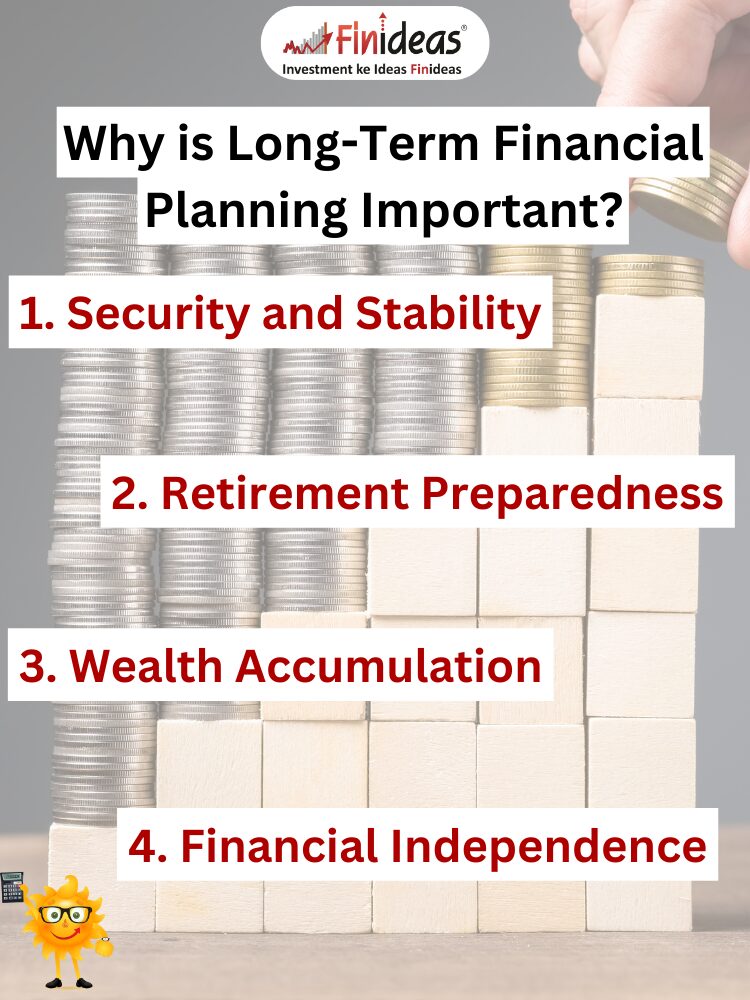Investing in for your Future
In today’s fast-paced world, securing your financial future is more critical than ever. While short-term gains might offer instant gratification, long-term financial planning is the cornerstone of lasting financial security and independence. This blog explores why long-term financial planning is essential and how you can start planning for a prosperous future.
What is Long-Term Financial Planning?
Long-term financial planning involves setting goals and creating a strategy to achieve financial security over an extended period, typically spanning several decades. This approach ensures that you have the financial resources to meet your future needs and objectives, such as retirement, education for your children, or purchasing a home.
Why is Long-Term Financial Planning Important?
Security and Stability:
Long-term planning provides a safety net, ensuring you have the resources to weather financial storms and unexpected expenses.
Retirement Preparedness:
With life expectancies rising, it’s crucial to plan for a retirement that could last 20-30 years or more.
Wealth Accumulation:
Consistent, long-term investments can significantly grow your wealth, thanks to the power of compound interest.
Financial Independence:
Proper planning allows you to achieve financial independence, giving you the freedom to make life choices without financial constraints.
How to Start Your Long-Term Financial Planning?
What Are Your Financial Goals?
The first step in long-term financial planning is identifying your goals. These might include:
– Saving for retirement
– Buying a home
– Funding your children’s education
– Starting a business
– Traveling the world
How Do You Assess Your Current Financial Situation?
Evaluate your current financial standing by looking at:
– Income and expenses
– Debts and liabilities
– Savings and investments
– Net worth
What is the Role of Budgeting?
Creating and sticking to a budget is fundamental. It helps you manage your income and expenses, ensuring you can save and invest for the future. Consider using budgeting tools or apps to track your spending and savings.
How Do You Build an Emergency Fund?
An emergency fund is crucial for financial security. Aim to save 3-6 months’ worth of living expenses in a readily accessible account. This fund will cover unexpected expenses such as medical bills, car repairs, or job loss.
What Investment Strategies Should You Consider?
Investing is key to growing your wealth. Diversify your investments to spread risk and increase potential returns. Consider:
– Stocks and bonds
– Mutual funds and ETFs
– Real estate
– Index Long Term Strategy
How Do You Plan for Retirement?
Start by estimating your retirement needs. Use retirement calculators to determine how much you need to save. Contribute regularly to retirement accounts and take advantage of employer matches if available. Adjust your plan as needed based on your age, risk tolerance, and retirement goals.
How Can You Stay on Track?
Regularly review and adjust your financial plan. Life changes, market conditions, and new goals may require updates to your strategy. Consider working with a financial advisor for personalized guidance.
What Are the Benefits of Long-Term Financial Planning?
- Peace of Mind: Knowing you have a plan provides peace of mind and reduces financial stress.
- Better Decision Making: A clear financial plan helps you make informed decisions about spending, saving, and investing.
- Legacy Planning: Long-term planning includes estate planning, ensuring your wealth is passed on according to your wishes.
- Achieving Dreams: Whether it’s buying a dream home, traveling the world, or retiring comfortably, long-term planning helps you achieve your life goals.
Now if you are someone who wants these benefits you must know about Index Long Term Strategy.
Ready to Take Control of Your Financial Future?
Long-term financial planning is a journey that requires commitment, discipline, and adaptability. Start today by setting clear goals, assessing your current situation, and creating a strategic plan. Remember, the earlier you start, the more time you have to grow your wealth and secure your future.
What are your top financial goals for the next 10-20 years, and how do you plan to achieve them? Comment down below!
Happy Investing!
This article is for education purpose only. Kindly consult with your financial advisor before doing any kind of investment..


